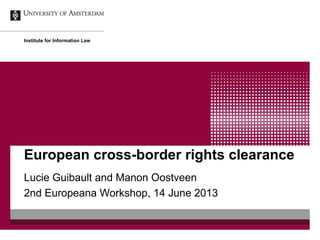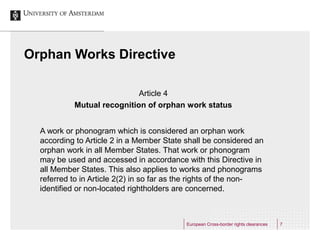Lucie Guibault - IViE - Cross Border Licensing 06.2013
- 1. European cross-border rights clearance Lucie Guibault and Manon Oostveen 2nd Europeana Workshop, 14 June 2013 Institute for Information Law
- 2. Contents ’éó Regulatory instruments ’éó Cross-border regimes ’éó Compatibility ’éó Workflow of cultural heritage institutions ’éó Conclusion Eruopean Cross-border rights clearance 2
- 3. Research question ’éó Will the work of cultural heritage institutions become easier by the introduction of the MoU, the Orphan Works Directive and the Directive on collective management and multi-territorial licensing of online musical works? ’éó Are the cross-border provisions of the three instruments compatible with each other? European Cross-border rights clearances 3
- 4. The Instruments ’éó Memorandum of Understanding (MoU) on out- of-commerce works ’éó Directive 2012/28/EU on certain permitted uses of orphan works ’éó Proposal for a directive on collective management of copyright and related rights and multi-territorial licensing of rights in musical works for online uses Type the footer here 4
- 5. European Cross-border rights clearances 5
- 6. MoU ’éó Rights clearance based on extended collective licensing ’éó Scope: multi-territory mono-repertoire (extended effect limited to national repertoire) ’éó No direct extra-territorial effect ’éó Possibility to limit scope of extended effect in types of uses and territory European Cross-border rights clearances 6
- 7. Orphan Works Directive Article 4 Mutual recognition of orphan work status A work or phonogram which is considered an orphan work according to Article 2 in a Member State shall be considered an orphan work in all Member States. That work or phonogram may be used and accessed in accordance with this Directive in all Member States. This also applies to works and phonograms referred to in Article 2(2) in so far as the rights of the non- identified or non-located rightholders are concerned. European Cross-border rights clearances 7
- 8. Draft Directive on Multi-territorial licensing ’éó Extra-territorial effect based on ŌĆśpassportŌĆÖ system ’éŻ One CMO gives mandate of representation to another CMO ’éó Likelihood of concentration of the market to a few ŌĆśsuperŌĆÖ CMOs ’éó Reciprocal agreements between CMOs still necessary Type the footer here 8
- 9. European Cross-border rights clearances 9
- 10. Compatibility Issues ’éó Form and scope of implementation of instruments still uncertain ’éó Potential for incompatibility between regimes at national and cross-border level because of possible co-existence of ECL for books/articles and Orphan Works status Type the footer here 10
- 11. European Cross-border rights clearances 11
- 12. European Cross-border rights clearances 12
- 13. Workflow of a CHI ’éó No single clear and comprehensive system to clear rights ’éó Potential problems of ’éŻ Restrictions ’éŻ Fragmentation ’éŻ Implementation Type the footer here 13
- 14. Solution? ’éó Conclusion of agreements between CMOs and CHIs for cross-border use of material ’éó Problem: not all sectors of copyright are equally organized to allow representative agreements to be concluded ’éó Other solutions???????? Type the footer here 14
- 15. Thank you very much! For more information Lucie Guibault L.Guibault@uva.nl or Manon Oostveen manon.oostveen@student.uva.nl European Cross-border rights clearances 15
Editor's Notes
- MoU: addressed to Member States and stakeholders ŌĆō In France, the Act essentially gives commercial publishers the right to publish out of commerce books ŌĆō libraries only have the right to make available after a period of 10 years of non-exploitation by any commercial publisher. Libraries are not the main beneficiaries of this instrument. Same remark with regards to Proposal for a Directive on collective rights management and multi-territorial licensing.















